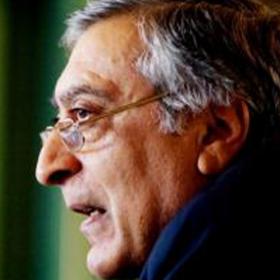
India's Interests in Afghanistan are Uncertain
EWI Board Member and former Foreign Secretary of India, Kanwal Sibal discusses what Ashraf Ghani's increasing engagement of Pakistan and China signals for Indo-Afghan relations in The Daily Mail.
Afghanistan President Ashraf Ghani’s visit to India will help set the new direction of bilateral ties.
India was the first country with which Afghanistan signed a strategic partnership agreement, but the dynamics of the relationship has changed with Ghani, a US-educated former World Bank official, assuming power.
Ghani has visited China, Saudi Arabia, Pakistan and the US before coming to India. In China he spoke incautiously of Afghanistan’s new external priorities which seem to have relegated India to the outermost circle.
He has also decided not to pursue the request for defence equipment from India, which would suit us as we are hardly in a position to substantially meet Afghanistan’s critical requirements, but this does jolt the relationship politically.
He obviously feels that he must engage Pakistan vigorously and obtain its cooperation for pushing the reconciliation process with the Taliban.
In this spirit he has made some unusual gestures, such as meeting the Pakistani army chief at his headquarters in Rawalpindi, besides engaging in coordinated operations with the Pakistan army against the Pakistani Taliban on Afghan soil.
Reconciliation
Ghani has also sent six officers for training at the Pakistani military academy to allay Pakistani anger at Afghan officers being trained exclusively in India.
In return, Pakistan has not yet concretely facilitated the reconciliation process, opening Ghani to domestic criticism for this lack of reciprocity.
Ghani is also counting on China to influence Pakistan to actively promote the reconciliation process, besides providing economic support to Afghanistan to compensate for the economic consequences of Western troop withdrawal.
He probably calculates that India’s capacity to economically help is limited because of lack of contiguity and negative Pakistani policies, and that China could be a more productive partner.
China has expressed its willingness to help in the reconciliation process. Its investment commitments — in the Aynak copper mines for instance — are known.
The China-Pakistan Economic Corridor project indicates far-reaching Chinese plans to bring this region into its economic orbit, from which Afghanistan would potentially benefit.
Ostensibly, Ghani is thinking in hard, practical terms of Afghanistan’s national interest. The Afghan polity is not unanimous on Ghani’s outreach to Pakistan and the Taliban.
If this is pushed too far without adequate fruits from the exercise appearing quickly, political fissures in Kabul could widen.
As it is, there is a suspicion that Ghani is seeking to strengthen the Pashtun elements in the polity at the expense of other ethnic groups. It is too early yet to see things clearly as no talks with the Taliban have begun.
Accommodating the Taliban in the power structure in Afghanistan unconditionally will meet resistance from other ethnic groups, especially the idea of giving them governorships and ministerial appointments outside any electoral process.
This will be seen as a weakening of the fledgling democratic base of the country.
Strategy
Whatever it might want the international community to believe, Pakistan has not given up its strategic ambitions in Afghanistan. It remains opposed to the Indian presence there.
The West accepts Pakistan’s strategic oversight over Afghanistan, even when it has suffered greatly from its duplicitous policies.
Pakistan has been the real problem in Afghanistan, providing safe-havens to the Taliban and abetting terrorist attacks there, but all this is being overlooked and Pakistan is now being seen as the key to the solution in Afghanistan.
With this kind of acceptance of Pakistan’s policy in Afghanistan, why should it change its strategic designs in that country?
Goodwill
For India this is a problem, as Pakistan will continue to impede India’s access to Afghanistan as well as Central Asia.
India will not be able to pursue its normal economic and other interests in this whole region because of the support the West and China give to Pakistani policies in Afghanistan.
With radical ideologies and terrorism spreading in this region, and Pakistan itself in the throes of terrorism and sectarian conflict, India’s security is under threat.
India needs to keep a presence in Afghanistan and Central Asia to consolidate its image as a benign partner capable of providing economic benefits and assistance, and maintaining a power balance in the region.
It does not serve the interest of Western democracies to weaken India’s position in Afghanistan to the advantage of a military-dominated, terrorism- riven, democratically weak and radicalising state like Pakistan.
Rationally, Kabul would need to maintain close ties with India to balance Pakistan and deter it from overreaching itself in Afghanistan.
India, which enjoys great goodwill in Afghanistan, would want to nurture it and not lower its profile in Afghanistan deliberately, especially in the economic area, building Afghan capacities and humanitarian exchanges.
India faces a big challenge, but its role and how it benefits the Afghan nation is understood by our many friends in Afghanistan, amongst whom President Ghani should rightfully figure.

